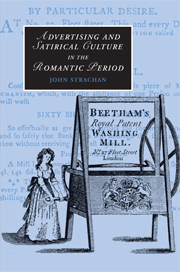Book contents
- Frontmatter
- Contents
- List of illustrations
- Acknowledgements
- Introduction
- 1 A ‘department of literature’: Advertising in the Romantic period
- 2 ‘Humbug and Co.’: Satirical engagements with advertising 1770–1840
- 3 ‘We keeps a poet’: Shoe blacking and the commercial aesthetic
- 4 ‘Publicity to a lottery is certainly necessary’: Thomas Bish and the culture of gambling
- 5 ‘Barber or perfumer’: Incomparable oils and crinicultural satire
- 6 ‘The poetry of hair-cutting’: J. R. D. Huggins, the emperor of barbers
- Conclusion: ‘Thoughts on puffs, patrons and other matters’: Commodifying the book
- Notes
- Bibliography
- Index
- CAMBRIDGE STUDIES IN ROMANTICISM
6 - ‘The poetry of hair-cutting’: J. R. D. Huggins, the emperor of barbers
Published online by Cambridge University Press: 22 September 2009
- Frontmatter
- Contents
- List of illustrations
- Acknowledgements
- Introduction
- 1 A ‘department of literature’: Advertising in the Romantic period
- 2 ‘Humbug and Co.’: Satirical engagements with advertising 1770–1840
- 3 ‘We keeps a poet’: Shoe blacking and the commercial aesthetic
- 4 ‘Publicity to a lottery is certainly necessary’: Thomas Bish and the culture of gambling
- 5 ‘Barber or perfumer’: Incomparable oils and crinicultural satire
- 6 ‘The poetry of hair-cutting’: J. R. D. Huggins, the emperor of barbers
- Conclusion: ‘Thoughts on puffs, patrons and other matters’: Commodifying the book
- Notes
- Bibliography
- Index
- CAMBRIDGE STUDIES IN ROMANTICISM
Summary
The particularity of this man put me into a deep thought whence it should proceed that of all the lower orders barbers should go further in hitting the ridiculous than any other set of men. Watermen brawl, cobblers sing: but why must a barber be for ever a politician, a musician, an anatomist, a poet, and a physician?
Sir Richard Steele on ‘Don Saltero’ (The Tatler, 1709)British consumer goods, as Balzac's César Birotteau demonstrates, achieved significant market penetration in continental Europe in the early nineteenth century. Unsurprisingly they also did so in the Anglophone United States of America. Whatever antipathies might have historically existed between the two countries and whatever mutual suspicion might remain, the former colony, in the decades after independence, retained many of its close cultural and commercial links with the old country. In economic terms British products, blacking, hair oils and razor strops among them, were highly successful in the youthful Republic. Looking back in 1857 at the first decade of the nineteenth century, the American Historical Magazine noted that the most notable British product of the day, Warren's Matchless, was one of the three most famous brands in the East Coast in the period, a time when ‘Warren's Blacking and Huggins, the New York Barber, and Pease's Hoarhound Candy were famous throughout Christendom’. Simultaneously, British satire, like many of the key literary brands of the late Georgian age, achieved a significant market share in American publishing, though, given the frequently piratical nature of that business, not always to the pecuniary advantage of the author.
- Type
- Chapter
- Information
- Advertising and Satirical Culture in the Romantic Period , pp. 226 - 252Publisher: Cambridge University PressPrint publication year: 2007



